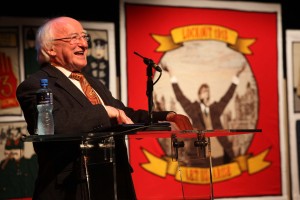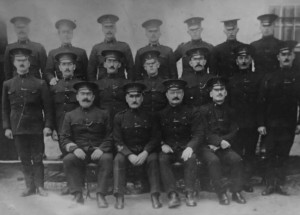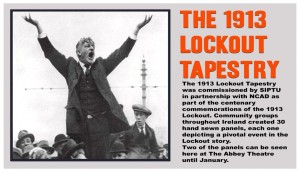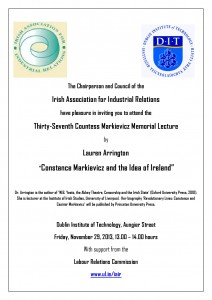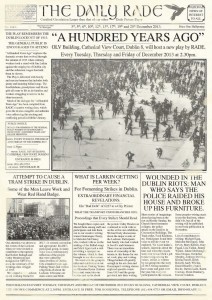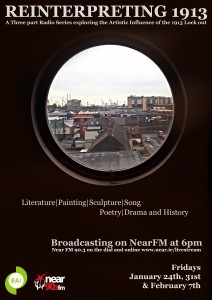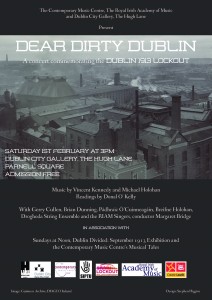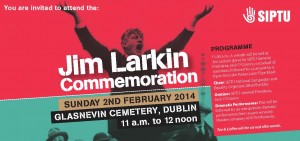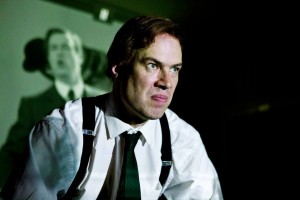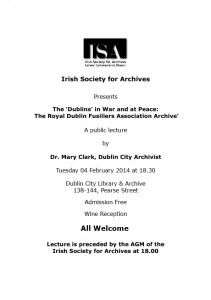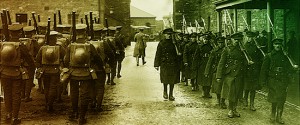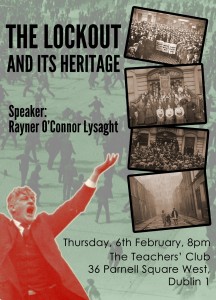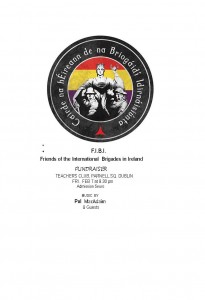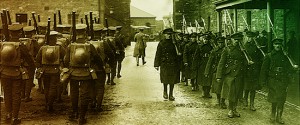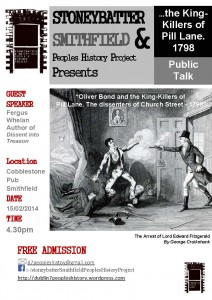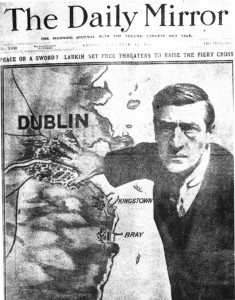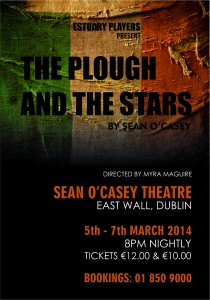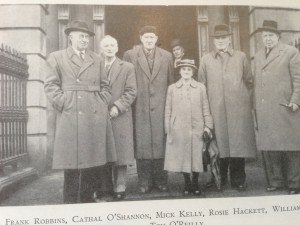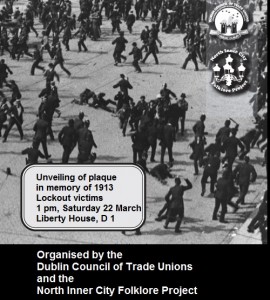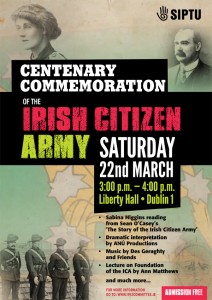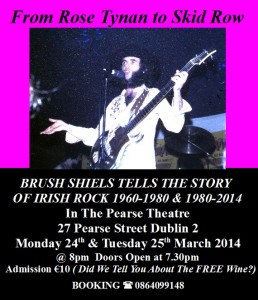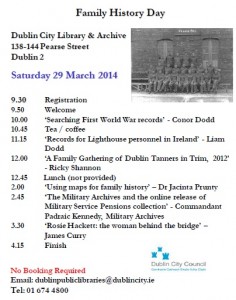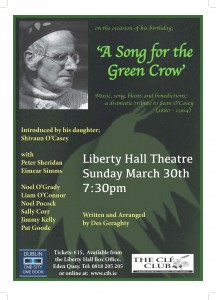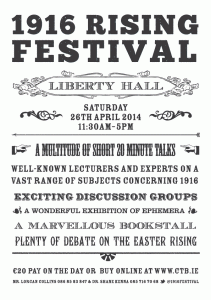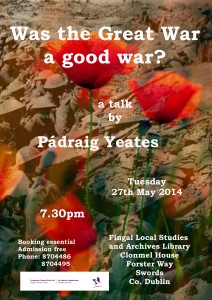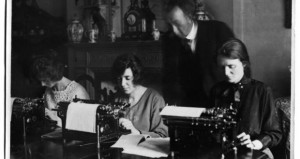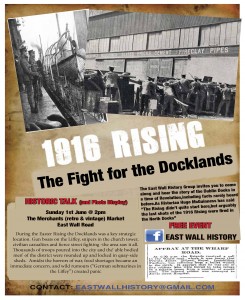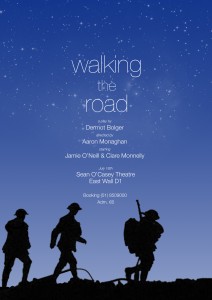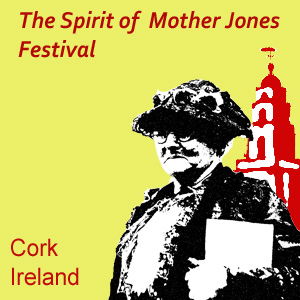Events
The Dublin Lockout Exhibition
August 21st until September 30th 2014 The Dublin Lockout Exhibition No 2 Kildare Street Dublin
This major exhibition shows Ireland in 1913 as a country in turmoil, divided by the issue of Home Rule – self-government for the country. Against this backdrop, a violent industrial conflict took centre stage: The Dublin Lockout. The NLI exhibition is free. It examines the background, events and aftermath of the conflict. The exhibition is part of a coordinated programme of events organised to commemorate the Dublin Lockout, and explore its contemporary resonance, as part of the Decade of Commemorations. It is a partnership between the National Library of Ireland and the Irish Congress of Trade Unions’ 1913 Commemoration Committee. The exhibition draws upon the NLI’s extensive historical and literary collections. It combines original documents, such as Jim Larkin’s hastily scribbled advice to union colleagues on the eve of “Bloody Sunday”, with multimedia presentations. Through the exhibition, visitors can share the experiences of those who lived through the Lockout, gaining a greater understanding of the issues facing the people of Dublin in 1913, and hear the opinions of present day commentators through short films and interactive touch screens. Opening Hours Mon – Wed: 9.30am – 7.45pm Thurs & Fri: 9.30am – 4.45pm Saturday: 9.30am – 4.30pm Sunday: 1:00pm – 4:45pm
Dublin Divided
September 26th 2013 – February 2nd 2014: 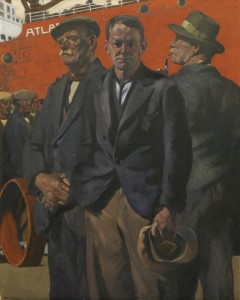 Dublin Divided: September 1913 provides an opportunity to reflect on the different agenda of the individuals involved in that momentous and bitter dispute and explore how the history of the Gallery was interwoven with the Lockout. The workers’ leader, James Larkin, though raised in poverty, appreciated art and beauty and sought the cultural as well as economic and social liberation of the manual labourer. Seán O’Casey noted that Larkin wanted the rose along with the loaf of bread on a worker’s table. James Larkin supported Lane’s Municipal Gallery project, and declared that William Martin Murphy, for his meanness in the matter of Sir Hugh Lane’s offer, would be condemned to keep an art gallery in Hell. A century later, the HughLaneGallery’s collection contains many portraits of the key individuals who were active in the Lockout as well as works by artists who became involved in the dispute, including William Orpen and George Russell (AE). The exhibition also provides a rich resource of evocative images that depict life in Dublin in the late nineteenth century and first decades of the twentieth century. The exhibition features paintings, sculpture and drawings by artists including John Lavery, Sarah Purser, John and Jack B. Yeats, Casimir Markievicz, Auguste Rodin, Sarah Cecilia Harrison, Maurice MacGonigal and Louis le Brocquy. Dublin Divided: September 1913 is curated by Margarita Cappock, Head of Collections, Dublin City Gallery The Hugh Lane. A fully illustrated catalogue will be available with essays by Padraig Yeates, Margarita Cappock and Helen Carey. Margarita Cappock: mcappock.hughlane@dublincity.ie, tel.: 01 2225557 Logan Sisley: logan.sisley@dublincity.ie, tel.: 01 2225562 Opening Hours Tuesday to Thursday 10.00am– 6.00pm Friday & Saturday 10.00am–5.00pm Sunday 11.00am–5.00pm Closed Mondays
Dublin Divided: September 1913 provides an opportunity to reflect on the different agenda of the individuals involved in that momentous and bitter dispute and explore how the history of the Gallery was interwoven with the Lockout. The workers’ leader, James Larkin, though raised in poverty, appreciated art and beauty and sought the cultural as well as economic and social liberation of the manual labourer. Seán O’Casey noted that Larkin wanted the rose along with the loaf of bread on a worker’s table. James Larkin supported Lane’s Municipal Gallery project, and declared that William Martin Murphy, for his meanness in the matter of Sir Hugh Lane’s offer, would be condemned to keep an art gallery in Hell. A century later, the HughLaneGallery’s collection contains many portraits of the key individuals who were active in the Lockout as well as works by artists who became involved in the dispute, including William Orpen and George Russell (AE). The exhibition also provides a rich resource of evocative images that depict life in Dublin in the late nineteenth century and first decades of the twentieth century. The exhibition features paintings, sculpture and drawings by artists including John Lavery, Sarah Purser, John and Jack B. Yeats, Casimir Markievicz, Auguste Rodin, Sarah Cecilia Harrison, Maurice MacGonigal and Louis le Brocquy. Dublin Divided: September 1913 is curated by Margarita Cappock, Head of Collections, Dublin City Gallery The Hugh Lane. A fully illustrated catalogue will be available with essays by Padraig Yeates, Margarita Cappock and Helen Carey. Margarita Cappock: mcappock.hughlane@dublincity.ie, tel.: 01 2225557 Logan Sisley: logan.sisley@dublincity.ie, tel.: 01 2225562 Opening Hours Tuesday to Thursday 10.00am– 6.00pm Friday & Saturday 10.00am–5.00pm Sunday 11.00am–5.00pm Closed Mondays
There are three exhibitions that have just opened at the National Museum of Ireland – Decorative Arts and History, Collins Barracks, Benburb Street, Dublin 7.
They are: 1913 Lockout: Impact & Aftermath, Banners Unfurled and Lockout: The Tapestry Opening Hours: Tuesday – Saturday: 10am – 5pm Sunday: 2pm – 5pm Closed Mondays
NOVEMBER
FRIDAY 8 NOVEMBER 9:45 Welcome Address: Felix Larkin, Chairman, NPHFI 10:00 – 12.00 Session 1 MUCKRACKERS AND THE PRESS Oliver O’Hanlon Henri Béraud: Blackguard, Muckraker and Crusader Chandra Clarke Telling it the Way She Saw It: Almena Davis Lomax, Journalist Patrick Maume D.P. Moran and The Leader Aoife Whelan Paper, tobacco, food and whiskey: Breandán Ó hEithir and the ‘craft’ of journalism 12:00 – 12:45 Lunch 12:45 – 15:00 SESSION 2 JOURNALISTS & PROPRIETORS Eugenia Palmegiano Looking Within/Looking Without: Periodicals’ Perceptions of Nineteenth-Century British Journalists John Horgan Editors: Powerful or Disposable? Louis MacRedmond and the Irish Independent David Finkelstein ‘A Last Hurrah’: The Powers of the Press as Represented in State of Play Ken Goldstein George McCullagh: How Canada’s almost-forgotten newspaper mogul altered the course of Canadian Journalism 15.00 0 15.30 Coffee Break 15:30 – 17:00 SESSION 3 CRUSADERS AND THE PRESS James Kelly Matthew Carey and the Volunteer’s Journal Myles Dungan Outing and othering: United Ireland and the Dublin Castle ‘scandals’ 1883-84 Mary Harris The significance of Eoin MacNeill’s contributions to the Irish Volunteer Sonya Perkins ‘Morbid stories are not wanted’: Fr Senan Moynihan, Editor of The Capuchin Annual 1930?54 17:00 – 18:00 Keynote Address: Martin Conboy, Professor of Journalism History, Sheffield University 19:30 – Late Conference Dinner SATURDAY 9 NOVEMBER 10:30 – 12.00 SESSION 4 1913 AND THE PRESS Karen Steele To Be Announced Padraig Yeates ‘The Lockout – A Very British Strike, A very Irish Commemoration’ Donal McCartney To Be Announced 12:00 – 13:00 Lunch 13:00 – 14:00 Keynote Address: Pauric Travers, St Patrick’s College, Dublin 14:00 – 16:00 SESSION 5 JOURNALISM & THE PROVINCIAL PRESS Mícheál Ó Fathartaig ‘The Connacht Sentinel’: T.J.W. Kenny on watch till death for Galway’s sake Des Marnane ‘The great Pashaw of the Crowbar Brigade’: Peter Gill, the Tipperary Advocate and revisiting the past Mark Wehrly ‘A pastime for heroes and career for performing gypsies’: The role of journalists in the development of the game of golf in Ireland since 1880 Ciaran Bartlett ‘His Corpse Was Mighty Poor Pickin’, Maglone’: The Life and Work of R. A. Wilson aka Barney Maglone 16:00 – 16:30 AGM Sunday, November 10th: 12 noon: James Byrne Commemoration. Assemble Main Gate Deans Grange Cemetery County Dublin 3pm: Lecture: 1913–A Country & A City at a Crossroads with Padraig Yeates, Journalist & Author Hugh Lane Gallery, Parnell Square, Dublin. This event is free and open to the public. Early arrival is recommended as places … 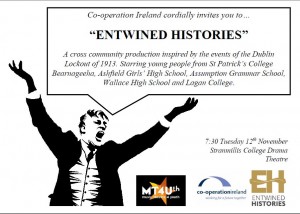 Tuesday, November 12th: 7.30pm: Entwined Histories, by students of St Patrick’s College, Bearnageerha, Ashfield Girls High School, Assumption Grammar School, Wallace High School and Lagan College, Stranmillis College, Drama Theatre, Belfast
Tuesday, November 12th: 7.30pm: Entwined Histories, by students of St Patrick’s College, Bearnageerha, Ashfield Girls High School, Assumption Grammar School, Wallace High School and Lagan College, Stranmillis College, Drama Theatre, Belfast 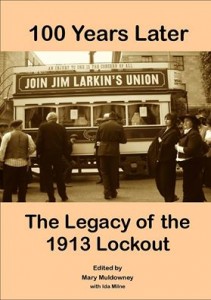 Thursday, November 14th: 6 pm: 100 Years Later: The Legacy of the 1913 Lockout: Book launch. Edited by Mary Muldowney and Ida Milne. Teachers Club, Parnell Square, Dublin. Speaker John Douglas, President of the Irish Congress of Trade Unions 7.30 pm: 1913, the British Army and the salvation of the labour movement, by Padraig Yeates, Royal Dublin Fusiliers Association,Pearse Street Library, Dublin
Thursday, November 14th: 6 pm: 100 Years Later: The Legacy of the 1913 Lockout: Book launch. Edited by Mary Muldowney and Ida Milne. Teachers Club, Parnell Square, Dublin. Speaker John Douglas, President of the Irish Congress of Trade Unions 7.30 pm: 1913, the British Army and the salvation of the labour movement, by Padraig Yeates, Royal Dublin Fusiliers Association,Pearse Street Library, Dublin 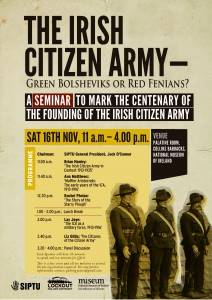 Saturday, November 16th:
Saturday, November 16th:
The Irish Citizen Army – Green Bolsheviks or Red Fenians?
A Seminar to Mark the Centenary of the founding of the Irish Citizen Army
Saturday, November 16th, 10.45 – 16.00
Venue: Palatine Room, Collins Barracks, National Museum of Ireland Programme 10.45: Brian Hanley: ‘The Irish Citizen Army in Context 1913-1935’ 11.30: Ann Matthews: ‘The early years: The structure and Politics of the ICA, 1913-1916’ 12.15: Rachel Phelan: ‘The Story of the Starry Plough’
Lunch Break 13.00 to 14.00
14.00: Lay Joye: ‘The ICA as a military force’ 14.45: Liz Gillis: ‘The Citizens of the Citizen 12 noon
GARDA HISTORICAL SOCIETY – FREE LECTURES
Beresford Tower, Dublin Castle
- 12 noon – The Lock Out by Mr. Padraig Yeates
- 2 pm – The Theft of the Irish Crown Jewels by Dr. Myles Dungan
- 4pm – Spying on Ireland – The Intelligence War during WWII by Prof. Eunan O’Halpin
Admission is free
For further information, please email gardahistoricalsociety@gmail.com Thursday, November 21st to Friday November 22nd Inaugural Conference for the Irish Centre for the Histories of Labour & Class, Moore Institute, NUI Galway – for details go to:
http://www.nuigalway.ie/
Thursday, November 28th to Saturday, February 1st, 2014
ABBEY THEATRE – THE RISEN PEOPLE
Monday – Saturday 7.30pm, Saturday matinees 2pm (18 January matinee 3pm) Sign-language interpreted performance: Thurs 23 January, 7.30pm Audio-described and captioned performance: Sat 25 January, 2pm Tickets prices: €13 – €45 / conc. €13 – €23
Friday, November 29th: 1pm: “Constance Markievicz and the Idea of Ireland”, by Lauren Arrington, author of W.B. Yeats, the Abbey Theatre, Censorship and the Irish State is giving the 37th Countess Markievicz Memorial Lecture. at the Dublin Institute of Technology, Aungier Street. With support from the Labour Relations Commission. www.ul.ie/iair
DECEMBER
2.30 pm: ‘A Hundred Years Ago’ A New Play by RADE – Every Tuesday, Thursday and Friday, OLV Building, Cathdral View Court, Dublin 8. Entrance Free. email info@rade.ie or Tel 454 8733
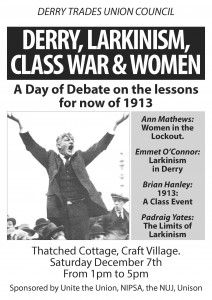 Saturday, December 7th 1 pm: Derry, Larkinism, Class War and Women, A Day of Debate on the Lessons for Now of 1913. Speakers, Ann Matthews on Women in the Lockout, Emmet O’Connor on Larkinism in Derry, Brian Hanley on 1913: A Class Event and Padraig Yeates on The Limits of Larkinism. Thatched Cottage, Craft Village, Derry
Saturday, December 7th 1 pm: Derry, Larkinism, Class War and Women, A Day of Debate on the Lessons for Now of 1913. Speakers, Ann Matthews on Women in the Lockout, Emmet O’Connor on Larkinism in Derry, Brian Hanley on 1913: A Class Event and Padraig Yeates on The Limits of Larkinism. Thatched Cottage, Craft Village, Derry 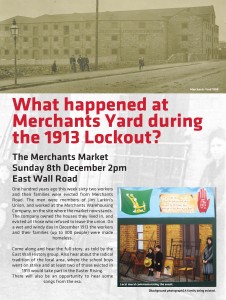 Sunday, December 8th 2 pm: Re-enactment of East Wall Evictions – Venue The Merchants Market, East wall, Dublin
Sunday, December 8th 2 pm: Re-enactment of East Wall Evictions – Venue The Merchants Market, East wall, Dublin 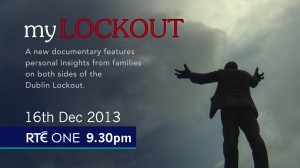 Monday, December 16th 9.30pm: RTE One will broadcast a documentary on My Lockout involving descendants of participants, as well as the usual talking heads giving historical context.
Monday, December 16th 9.30pm: RTE One will broadcast a documentary on My Lockout involving descendants of participants, as well as the usual talking heads giving historical context.
1914
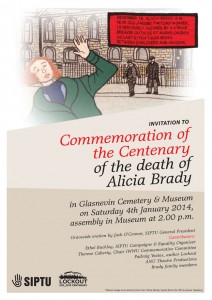 Saturday, January 4th: 2pm: The 1913 Lockout Centenary is not over yet – thousands of workers and their families were still subjected to extreme suffering a state repression in the winter of 1913-1914. One of the last casualties of the struggle for union recognition was 16 year old Alicia Brady’s death on January 1st. Her funeral took place on January 4th, 1914. On Saturday, January 4th, the 1913 Committee is holding a commemoration at 2pm, the same time as her funeral one hundred years ago on that day.
Saturday, January 4th: 2pm: The 1913 Lockout Centenary is not over yet – thousands of workers and their families were still subjected to extreme suffering a state repression in the winter of 1913-1914. One of the last casualties of the struggle for union recognition was 16 year old Alicia Brady’s death on January 1st. Her funeral took place on January 4th, 1914. On Saturday, January 4th, the 1913 Committee is holding a commemoration at 2pm, the same time as her funeral one hundred years ago on that day. 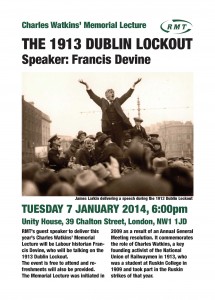 Tuesday, January 7th: 6pm: RMT’s guest speaker to deliver this year’s Charles Watkins’ Memorial Lecture will be Labour historian Francis Devine, who will be talking on the 1913 Dublin Lockout. The event is free to attend and refreshments will also be provided. Unity House, 39 Chalton Street, London, NW1 1JD. The Memorial Lecture was initiated in 2009 as a result of an Annual General Meeting resolution. It commemorates the role of Charles Watkins, a key founding activist of the National Union of Railwaymen in 1913, who was a student at Ruskin College in 1909 and took part in the Ruskin strikes of that year. Monday, January 14th: 8.00 pm: The 1913-1914 Lock-out in Kingstown week-by-week, by Charles Callan, Dun Laoghaire College of Further Education,
Tuesday, January 7th: 6pm: RMT’s guest speaker to deliver this year’s Charles Watkins’ Memorial Lecture will be Labour historian Francis Devine, who will be talking on the 1913 Dublin Lockout. The event is free to attend and refreshments will also be provided. Unity House, 39 Chalton Street, London, NW1 1JD. The Memorial Lecture was initiated in 2009 as a result of an Annual General Meeting resolution. It commemorates the role of Charles Watkins, a key founding activist of the National Union of Railwaymen in 1913, who was a student at Ruskin College in 1909 and took part in the Ruskin strikes of that year. Monday, January 14th: 8.00 pm: The 1913-1914 Lock-out in Kingstown week-by-week, by Charles Callan, Dun Laoghaire College of Further Education, 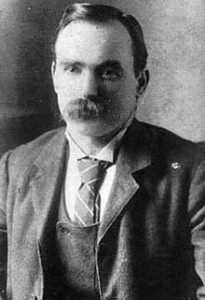 Wednesday, January 15th: 5.45pm: ‘Labor & Dignity – James Connolly in America’ Exhibition Launch at TCD: The Trinity Long Room Hub Arts and Humanities Research Institute is currently hosting an exhibition by New York University’s Glucksman Ireland House on the time that James Connolly spent in the United States between 1903 and 1910, where he witnessed the successes and failures of labor radicalism and unionization, and of working class conditions resulting from unregulated corporate expansion. The exhibition was funded by the Government of Ireland’s Department of Foreign Affairs and Trade as a contribution to Ireland’s Decade of Commemorations. To mark the launch of the exhibition in Trinity, Daphne Dyer Wolf will give a talk on the concept and research underpinning the exhibition. Ms Wolf is a PhD Candidate in History and Culture at Drew University and curated the exhibition with Prof Marion Casey, faculty member at Glucksman Ireland House, NYU. All welcome.
Wednesday, January 15th: 5.45pm: ‘Labor & Dignity – James Connolly in America’ Exhibition Launch at TCD: The Trinity Long Room Hub Arts and Humanities Research Institute is currently hosting an exhibition by New York University’s Glucksman Ireland House on the time that James Connolly spent in the United States between 1903 and 1910, where he witnessed the successes and failures of labor radicalism and unionization, and of working class conditions resulting from unregulated corporate expansion. The exhibition was funded by the Government of Ireland’s Department of Foreign Affairs and Trade as a contribution to Ireland’s Decade of Commemorations. To mark the launch of the exhibition in Trinity, Daphne Dyer Wolf will give a talk on the concept and research underpinning the exhibition. Ms Wolf is a PhD Candidate in History and Culture at Drew University and curated the exhibition with Prof Marion Casey, faculty member at Glucksman Ireland House, NYU. All welcome. 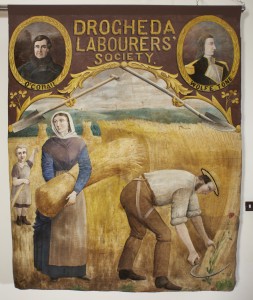 Wednesday, January 15th: 8pm: The 2014 lecture programme of the Old Drogheda Society opens with an illustrated talk about the Great Dublin Lock-Out of 1913, its local impact and its aftermath by Francis Devine in the Governor’s House, Millmount, Drogheda. Francis Devine, the acclaimed labour historian, author, poet and singer and his colleague, Fergus Russell, will tell the story of the Lock-Out through the songs and stories of the time, accompanied by fascinating contemporary images. He has collected the contemporary songs and poems relating to the dispute and the singing of these songs, most of which have not been heard for a century. Representatives of the Millmount Research Unit will complement this exciting material with a parallel presentation on the reporting of the dispute in the local newspapers. Although Drogheda itself was not directly involved in the cataclysmic events in the capital city, the story of the struggle of the farm labourers of North County Dublin for union recognition and for better wages and conditions cannot be separated from the better known events in Dublin. As well as telling this story in detail, the presentation will also deal with the conflict within the communities of North Dublin, the response of the Church to the industrial unrest and the political developments arising from the dispute that prepared the way for a refocusing on the National Question and opened the path to the 1916 Rising. Thursday, January 16th to Saturday, January 18th: Ireland’s national theatre presents a three-day symposium to debate the role of theatre in commemoration. Leading Irish playwrights, actors, directors and academics will come together to discuss the role of memory in making theatre and the challenges of commemorating historical events. Other speakers include, Thomas Kilroy, Declan Kiberd, Dr. Emelie Pine, Fintan O’Toole, Richard Kearney, Roddy Doyle, Dr. Cathy Leeney, Louise Lowe, Dr. Fearghal McGarry and Emer O’Kelly amongst others. Here is a link to the full programme: http://www.abbeytheatre.ie/whats_on/event/the-theatre-of-memory-symposium/
Wednesday, January 15th: 8pm: The 2014 lecture programme of the Old Drogheda Society opens with an illustrated talk about the Great Dublin Lock-Out of 1913, its local impact and its aftermath by Francis Devine in the Governor’s House, Millmount, Drogheda. Francis Devine, the acclaimed labour historian, author, poet and singer and his colleague, Fergus Russell, will tell the story of the Lock-Out through the songs and stories of the time, accompanied by fascinating contemporary images. He has collected the contemporary songs and poems relating to the dispute and the singing of these songs, most of which have not been heard for a century. Representatives of the Millmount Research Unit will complement this exciting material with a parallel presentation on the reporting of the dispute in the local newspapers. Although Drogheda itself was not directly involved in the cataclysmic events in the capital city, the story of the struggle of the farm labourers of North County Dublin for union recognition and for better wages and conditions cannot be separated from the better known events in Dublin. As well as telling this story in detail, the presentation will also deal with the conflict within the communities of North Dublin, the response of the Church to the industrial unrest and the political developments arising from the dispute that prepared the way for a refocusing on the National Question and opened the path to the 1916 Rising. Thursday, January 16th to Saturday, January 18th: Ireland’s national theatre presents a three-day symposium to debate the role of theatre in commemoration. Leading Irish playwrights, actors, directors and academics will come together to discuss the role of memory in making theatre and the challenges of commemorating historical events. Other speakers include, Thomas Kilroy, Declan Kiberd, Dr. Emelie Pine, Fintan O’Toole, Richard Kearney, Roddy Doyle, Dr. Cathy Leeney, Louise Lowe, Dr. Fearghal McGarry and Emer O’Kelly amongst others. Here is a link to the full programme: http://www.abbeytheatre.ie/whats_on/event/the-theatre-of-memory-symposium/
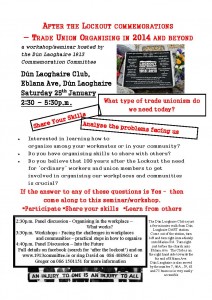 Saturday, January 25th: 2:30pm: After Lockout Centenary – Trade Union Organising in 2014 and Beyond Introduction – Gerry Craughwell, president Teachers Union of Ireland
Saturday, January 25th: 2:30pm: After Lockout Centenary – Trade Union Organising in 2014 and Beyond Introduction – Gerry Craughwell, president Teachers Union of Ireland
- The Irrepressible Rosie Hackett
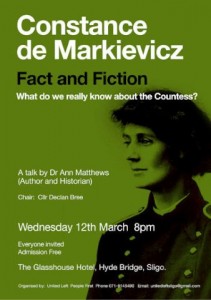 Wednesday, March 12th: Countess Markievicz: Fact and Fiction: What do we really know about the Countess? A talk by Ann Matthews, The Glasshouse Hotel, Hyde Bridge, Sligo.
Wednesday, March 12th: Countess Markievicz: Fact and Fiction: What do we really know about the Countess? A talk by Ann Matthews, The Glasshouse Hotel, Hyde Bridge, Sligo.
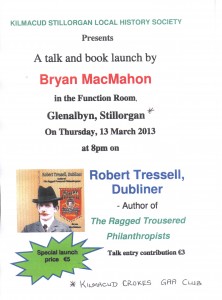
Thursday, March 13th:
The Pearse Theatre, 27 Pearse Street, Dublin 2.
Doors Open at 7.30pm. Admission €10.
BOOKING 0864099148
Saturday, March 29th: Family History Day Pearse Street Library, Dublin
9.30 am: Registration
9.50 am: We
lcome
10.00 am: ‘Searching First World War Records’, Conor Dodd
10.45 am: Tea and Coffee
11.00 am: ‘Records of Lighthouse personnel in Ireland’, Liam Dodd
12.00: ‘A Fami;y Gathering of Dublin Tanners in Trim 2012’, Ricky Shannon
12.45 pm: Lunch Break
14.00 pm: ‘Using Maps for Family History’, Jacinta Prunty
14.45 pm: The Military Archives and online release of Military Service Pensions’, Commandant Padraic Kennedy
15.30 pm: ‘Rosie Hackett: the woman behind the bridge’ – James Curry
16.15 pm: Finish
“A Song For The Green Crow”, at Liberty Hall Theatre, Eden Quay, Dublin 1 on the occasion of the birthday of Sean O’Casey marking the 50th anniversary of his death, a lively and dramatic tribute by his daughter Shivaun O’Casey. The programme combines a colourful selection of O’Casey’s songs, music and writings with characteristic ‘blasts and benedictions’. These illustrations of his life and times are seen through the loving eyes of his wife Eileen. With Peter Sheridan and Eimear Simms and music from Noel O’Grady, Liam O’Connor, Noel Pocock, Sally Corr, Jimmy Kelly and Pat Goode. The Production is arranged and directed by Des Geraghty on behalf of the Cle Club. Tickets €15 from Liberty Hall Box Office, Tel 0818 205205 or online at www.ctb.ie
Wednesday, April 2nd: 6.30 pm: Lectures on the history of the Dublin Council of Trade Unions by Shay Cody, General Secretary of IMPACT and Peter Rigney, Industrial Officer, ICTU, at People’s College,. Details also here: http://www.peoplescollege.ie/events/2014/04/02/dctu-history-lecture/ Friday and Saturday, April 4th and 5th: Women’s History Association of Ireland (WHAI) Annual Conference 2014 Cumann na mBan 100: 1914-2014, National Museum of Ireland, Collins Barracks, Dublin Friday, April 4th: 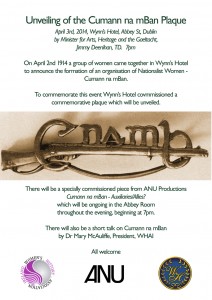 11-12am. Registration 12-1.30pm – Parallel Sessions: Panel I: Chair:Dr Mary McAuliffe, Images of Cumann na mBan, Liz Gillis, Kilmainham Jail Museum ‘Love and Loss in the Irish Revolution’ , Kirste McCool, University of Brighton The images of de Markievicz’, Claire Gibbons, Trinity College Dublin, Women, National Identity and the paintings of Paul Henry, Panel 2: Chair: Dr Ida Milne : Women’s ‘work’ 1912-1920, Dr So Young Park, Gustavus Adolphus College, Minnesota, USA, The Political and Humanitarian Work of Dora Shorter, 1915-1918, Gerri O’Neill, Mater Dei Institute of Education (DCU), “Stop the blasted forming fours, get out of Cumann na mBan and do some work” – (Michael Collins to Moira Kennedy O’Byrne, 1919.), Pamela McKane, York University, Toronto, Ontario, “No idle sightseers”: The Ulster Women’s Unionist Council and the Ulster Crisis (1912-1914) 1.30-2.00 Break – teas and coffees ~ 2.00-3.00 – Keynote speaker 1 Chair: Dr Mary McAuliffe: Dr Joost Augusteijn, ‘The role of women in shaping IRA tactics, 1913-1998. The case of the hunger strike’ 3.00-4.45 Parallel Sessions : Female activism – continuity and change Panel I: Chair Dr Sarahanne Buckley: Dieter Reinisch, University of Vienna, Austria, The Forgotten Cumann na mBan: Irish Republican Women during the Northern Irish Troubles, Siobhan Delaney, University College Cork, Cumann na mBan;1921-1932, Dr Gearóid Ó Faoleán, University of Limerick Cumann na mBan 100 Conference Organising Committee: Dr Mary McAuliffe, Dr Conor Reidy, Dr Leeann Lane, Gerri O’Neill, Unbroken continuity? Cumann na mBan and female IRA volunteers during the ‘Troubles’ , Eamonn T. Gardiner, NUI, Galway, The Other Auxiliaries: Lady Police Searchers and the Anglo-Irish War Panel 2: Chair Dr Sandra McAvoy: Femininity, activism and ‘speaking the truth’ – portrayals of activist women Holly Dunbar, University of Southampton, ‘The Irishwoman: Maid, Wife and Mother’: Constructions of Irish femininity in the mainstream nationalist press. Claire McGrath Guerin, UCC, “Speaking truths”? The role of women in publicity during the Irish Civil War. Dr Christi McCallum, University of Southern Indiana ‘The Daughters Who Served Her in Danger’: Women, Family, and Revolutionary Activism in Ireland, 1912-1923, Dr Clare Gorman. National University of Ireland, Maynooth. ‘You’d do far more work with a knife an’ fork than ever you’ll do with a shovel’: The Portrayal of Gender within Sean O’Casey’s Juno and the Paycock 4.45-5.00- Break – teas and coffees 5.00-6.00-Keynote speaker 2 Chair: Dr Conor Reidy: Dr Margaret Ward “Unmanageable Revolutionaries revisited: the early years of Cumann na mBan” 6-7.30 – Book launch and wine reception: Senia Paseta Irish Nationalist Women; 1900-1918 (Cambridge University Press)
11-12am. Registration 12-1.30pm – Parallel Sessions: Panel I: Chair:Dr Mary McAuliffe, Images of Cumann na mBan, Liz Gillis, Kilmainham Jail Museum ‘Love and Loss in the Irish Revolution’ , Kirste McCool, University of Brighton The images of de Markievicz’, Claire Gibbons, Trinity College Dublin, Women, National Identity and the paintings of Paul Henry, Panel 2: Chair: Dr Ida Milne : Women’s ‘work’ 1912-1920, Dr So Young Park, Gustavus Adolphus College, Minnesota, USA, The Political and Humanitarian Work of Dora Shorter, 1915-1918, Gerri O’Neill, Mater Dei Institute of Education (DCU), “Stop the blasted forming fours, get out of Cumann na mBan and do some work” – (Michael Collins to Moira Kennedy O’Byrne, 1919.), Pamela McKane, York University, Toronto, Ontario, “No idle sightseers”: The Ulster Women’s Unionist Council and the Ulster Crisis (1912-1914) 1.30-2.00 Break – teas and coffees ~ 2.00-3.00 – Keynote speaker 1 Chair: Dr Mary McAuliffe: Dr Joost Augusteijn, ‘The role of women in shaping IRA tactics, 1913-1998. The case of the hunger strike’ 3.00-4.45 Parallel Sessions : Female activism – continuity and change Panel I: Chair Dr Sarahanne Buckley: Dieter Reinisch, University of Vienna, Austria, The Forgotten Cumann na mBan: Irish Republican Women during the Northern Irish Troubles, Siobhan Delaney, University College Cork, Cumann na mBan;1921-1932, Dr Gearóid Ó Faoleán, University of Limerick Cumann na mBan 100 Conference Organising Committee: Dr Mary McAuliffe, Dr Conor Reidy, Dr Leeann Lane, Gerri O’Neill, Unbroken continuity? Cumann na mBan and female IRA volunteers during the ‘Troubles’ , Eamonn T. Gardiner, NUI, Galway, The Other Auxiliaries: Lady Police Searchers and the Anglo-Irish War Panel 2: Chair Dr Sandra McAvoy: Femininity, activism and ‘speaking the truth’ – portrayals of activist women Holly Dunbar, University of Southampton, ‘The Irishwoman: Maid, Wife and Mother’: Constructions of Irish femininity in the mainstream nationalist press. Claire McGrath Guerin, UCC, “Speaking truths”? The role of women in publicity during the Irish Civil War. Dr Christi McCallum, University of Southern Indiana ‘The Daughters Who Served Her in Danger’: Women, Family, and Revolutionary Activism in Ireland, 1912-1923, Dr Clare Gorman. National University of Ireland, Maynooth. ‘You’d do far more work with a knife an’ fork than ever you’ll do with a shovel’: The Portrayal of Gender within Sean O’Casey’s Juno and the Paycock 4.45-5.00- Break – teas and coffees 5.00-6.00-Keynote speaker 2 Chair: Dr Conor Reidy: Dr Margaret Ward “Unmanageable Revolutionaries revisited: the early years of Cumann na mBan” 6-7.30 – Book launch and wine reception: Senia Paseta Irish Nationalist Women; 1900-1918 (Cambridge University Press) 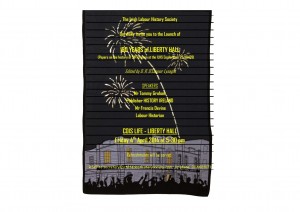 5.50 pm: 100 Years of Liberty Hall: Edited by D R Lysaght, Book Launch, Liberty Hall. Speakers Tommy Graham of History Ireland and Francis Devine, Historian
5.50 pm: 100 Years of Liberty Hall: Edited by D R Lysaght, Book Launch, Liberty Hall. Speakers Tommy Graham of History Ireland and Francis Devine, Historian 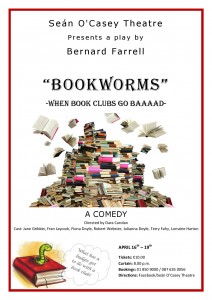 April 16th to 19th 8 pm: When Book Clubs Go Baaad, A Comedy by Dara Carolan, Sean O’Casey Theatre, East Wall. Admission 10. Bookings Tel: 01 850 9000 and 087 635 0056
April 16th to 19th 8 pm: When Book Clubs Go Baaad, A Comedy by Dara Carolan, Sean O’Casey Theatre, East Wall. Admission 10. Bookings Tel: 01 850 9000 and 087 635 0056 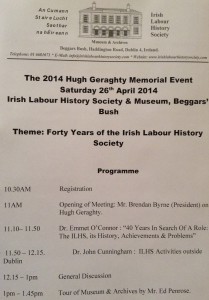 Saturday, April 26th: 10.30 am to 1.45 pm: Hugh Geraghty Memorial Event, 40 Years in Search of a Role: The Irish Labour History Society, its History, Achievements and Problems by Dr Emmet O’Connor and ILHS Activities Outside by Dr John O’Connor, Followed by Tour of the ILHS Museum and Archives by ed Penrose, Beggars’ Bush, Dublin 4
Saturday, April 26th: 10.30 am to 1.45 pm: Hugh Geraghty Memorial Event, 40 Years in Search of a Role: The Irish Labour History Society, its History, Achievements and Problems by Dr Emmet O’Connor and ILHS Activities Outside by Dr John O’Connor, Followed by Tour of the ILHS Museum and Archives by ed Penrose, Beggars’ Bush, Dublin 4
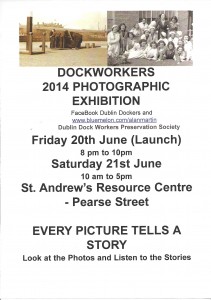 Friday 20th June and Saturday June 21st:See poster above – Dockworkers 2014 Photographic Exhibition
Friday 20th June and Saturday June 21st:See poster above – Dockworkers 2014 Photographic Exhibition
Theme: “The Great War”
June 27th – June 29th, 2014
In association with
WEXFORD COUNTY COUNCIL, HISTORY IRELAND & KEOUGH – NAUGHTON NOTRE DAME CENTRE, DUBLIN
By any standard, The Great War was a cataclysmic event with profound long term outcomes for individuals, families, communities, nations, politics, social theory and international relations. It was truly world changing. The loss of life, injuries, destruction and social disruption were massiv and devastating.
In Ireland it had a very dramatic impact. Home Rule was sidelined and radical separatism took centre stage. County Wexford, the native country of Parliamentary Party Leader John Redmond, lost over 800 men in the war and we have a special Wexford focus in this year’s programme.
All of us associated with the Summer School look forward to welcoming you to the 20th Summer School.
Fr. Walter Forde
.
![]()
2014 Theme: Theme: “The Great War”
Venue: Gorey Library & Adult Learning Centre at the Civic Square,The Avenue, Gorey
| Friday 27th June | 7.00 p.m. | Registration and Reception |
| 8.00 p.m. |
Opening address: Professor Daire Keogh, President, St, Patrick’s College, Drumcondra. |
|
| 8.30 p.m. |
Gordon Wilson Memorial Lecture: “John Redmond and The Great War” Speaker: Dermot Meleady, Historian Chair: David O’Morchoe, Librarian (The O’Morchoe), |
|
|
Saturday 28th June
|
9.30 a.m.
|
“The Irish at War: On foreign Fields ” Speakers: Meredith Meagher (Notre Dame), Philip Orr (Author), Ida Milne (Trinity College Dublin), Conor McNamara (Summer School Director) |
| 11.30 a.m. |
Coffee break |
|
| 12:00 a.m. |
“Ireland and The Great War: The Home Front ” Speakers: Padraig Yeates (SIPTU Revd. Brian Kenneway (Irish Association for Culture, Economic and Social Relations), John Cunningham (NUIG) |
|
| 1.30 p.m. | Lunchtime snack at Summer School venue | |
|
2.30 p.m.
|
Fieldtrip led by MONICA CROFTON:“Wexford Town Sites associated with John redmond and The Great War” |
|
| 7.00 p.m. | Summer School dinner at Forde’s Restaurant, Castlebridge |
Sunday 29th June11.00 a.m.
History Ireland Hedge School – “Ireland and the Legacy of The Great War” Speaker: edward Madigan (Royle Holloway University of London
Chair: John Gibney, History Ireland. 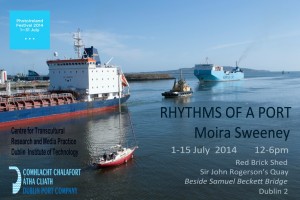 RHYTHMS OF A PORT A Film Installation PhotoIreland Festival 2014 http://2014.photoireland.org/
RHYTHMS OF A PORT A Film Installation PhotoIreland Festival 2014 http://2014.photoireland.org/
The 2014 Spirit of Mother Jones festival/ summer school will be held in Cork city from Tuesday 29th July until Friday 1st August 2014
Spirit of Mother Jones Festival 2014
SUNDAY, AUGUST 10th:
15:00-16:00: Registration
16:30: Official opening
Keynote Address Brendan Simms, Professor of the History of International Relations, University of Cambridge – The German question and European problem
20:30: Informal social evening at the Woodenbridge Hotel
MONDAY, AUGUST 11th:
10:00: Lecture Heather Jones, Associate Professor in International History, London School of Economics – Violent transgression and the First World War, 1914–1918
11:00: Coffee
11:30: Lecture Dagmar Ó Riain-Raedel, Department of History, University College Cork – ‘The peace before the war’: a lecture to commemorate the 1000th anniversary of the Battle of Clontarf
12:30: Lunch
14:30: Panel Discussion: ‘Your country needs you’ – patriotism in the twenty-first century – Cllr Kate Feeney, Dun Laoghaire County Council and president of Ógra Fianna Fáil – John Larkin QC, Attorney-General of Northern Ireland – Paschal Donohoe TD, Minister of State for European Affairs
19:30: Brian Cregan (judge of the High Court) will read from his novel, Parnell (2013), Woodenbridge Hotel
TUESDAY, AUGUST 12th:
10:00: Parnell Lecture – Conor Mulvagh, Lecturer in Irish History (Decade of Commemorations, 2013–1923), University College Dublin – The chief and the chairman: Parnell and Redmond compared
11:00: Coffee
11:30: PERSONALITIES IN WAR
• The Hon. Hugh O’Flaherty, former judge of the Supreme Court – Monsignor Hugh O’Flaherty • Christopher Power, independent scholar – Percival Lea-Wilson
12:30: Lunch
14:30: Guided Bus Tour, featuring a re-enactment of Redmond’s Woodenbridge speech in 1914 and a visit to the Kynoch munitions factory in Arklow.
20:30: Musical Entertainment, Woodenbridge Hotel
WEDNESDAY, AUGUST 13th
10:00: Lecture Tom Bartlett, Professor of Irish History, University of Aberdeen – The Irish at war, from earliest times to the twentieth century
11:00: Coffee
11:30: Lecture Ian d’Alton, Visiting Fellow at Sidney Sussex College, University of Cambridge (2014) – Sentiment, duty, money, identity? Motivations for the southern Irish Protestant involvement in two world wars
12:30: Lunch
14:30: Lecture John Horne, Professor of Modern European History, Trinity College Dublin – Ireland and the Great War, 1914–1918
20:00: Gala dinner, Woodenbridge Hotel
THURSDAY, AUGUST 14th
10:00: COMMEMORATION • Angela Griffith, Lecturer in the Department of History of Art and Architecture, Trinity College Dublin – Harry Clarke and the First World War memorial books • Jeff Kildea, University of New South Wales & 2014 Keith Cameron Professor of Australian History, University College Dublin – Commemoration of the First World War in Australia
11:00: Coffee
11:30: Lecture L. Perry Curtis Jr, Emeritus Professor of British and Irish History, Brown University, Rhode Island – Rethinking the origins of the Land War in Ireland
12:30: Lunch
14.30: Lecture Peter Murtagh, Reporter, The Irish Times – William Howard Russell, war correspondent
16:00: Close of Summer School 2014
Dun Laoghaire: THE WAR TO END ALL WARS 1914-1918 – Martime Institute of Ireland – NATIONAL HERITAGE WEEK – Venue Dun Laoghaire Club, Eblana Avenue
Sunday, August 31st:
11.30 am: Registration commences
12 noon: “BUILD UP TO WAR AND THOSE OPPOSED” by Roger Cole of the Peace and Neutrality Alliance.
12.45 pm: “WAS WAR A GOOD THING FOR DUBLINERS ?” by Padraig Yeates, Author of A City in Wartime: Dublin 1914-1918
1.30 pm: “THE SINKING OF THE RMS LEINSTER” by Roy Stokes, who will provide new material on the sinking of the mail-boat, including interview with Jim Sweeney, the Second Purser on the ship
2.15 pm: “THE COLONIES AND THE FREEDOM OF SMALL NATIONS” and “SHOT AT DAWN, RACIAL SEGREGATION AND FLOGGING ON WWI WAR SHIPS by Padraig Mannion, editor of DUN LAOGHAIRE AND THE 1913 LOCKOUT
3 pm: “UNCLE SAM’S NAVY” by Pat Sweeney Author of Liffey Ships and Shipbuilding
3.45 pm: “WITH REGARD TO THE LUSITANIA-ARMS AND THE SHIP” by David Snook
4.30 pm: “SS KELP-4 FLAGS IN WAR”, John Treacy, Department of History, University of Limerick looks at German ship captured and used by allied forces before being wrecked off Spanish Point in County Clare
5.15 pm: “WINSTON CHURCHILL – WORST LORD OF THE ADMIRALTY?” – speaker to be announced
6 pm: “LEST WE FORGET OR BEST WE FORGET ?” by Tim Pat Coogan
When formal discussions conclude it will be time for music and song of the WWI period when professional musician William Byrne and guests perform. All in all a great day of lectures, debates and discussion on the dreadful War to end all war. Voluntary donations at door to help cover costs
Greaves School Friday, September 12th to Sunday, 14th
Friday, 7:30: The Ideology of Remembrance – Ireland and the First World War, Brian Hanley, historian, author of A Documentary History of the IRA, 1916-2005 and The Lost Revolution: the story of the Official IRA and the Workers Party (With Scott Millar) and Michael Quinn, historian, has recently completed a doctorate on Irish Soviet relations and is currently specialising in Ireland and First World War. Chair: Tommy Graham, historian, is Editor and founder of History Ireland magazine.
Venue: The Ireland Institute, 27 Pearse Street, Dublin 2, Ireland

